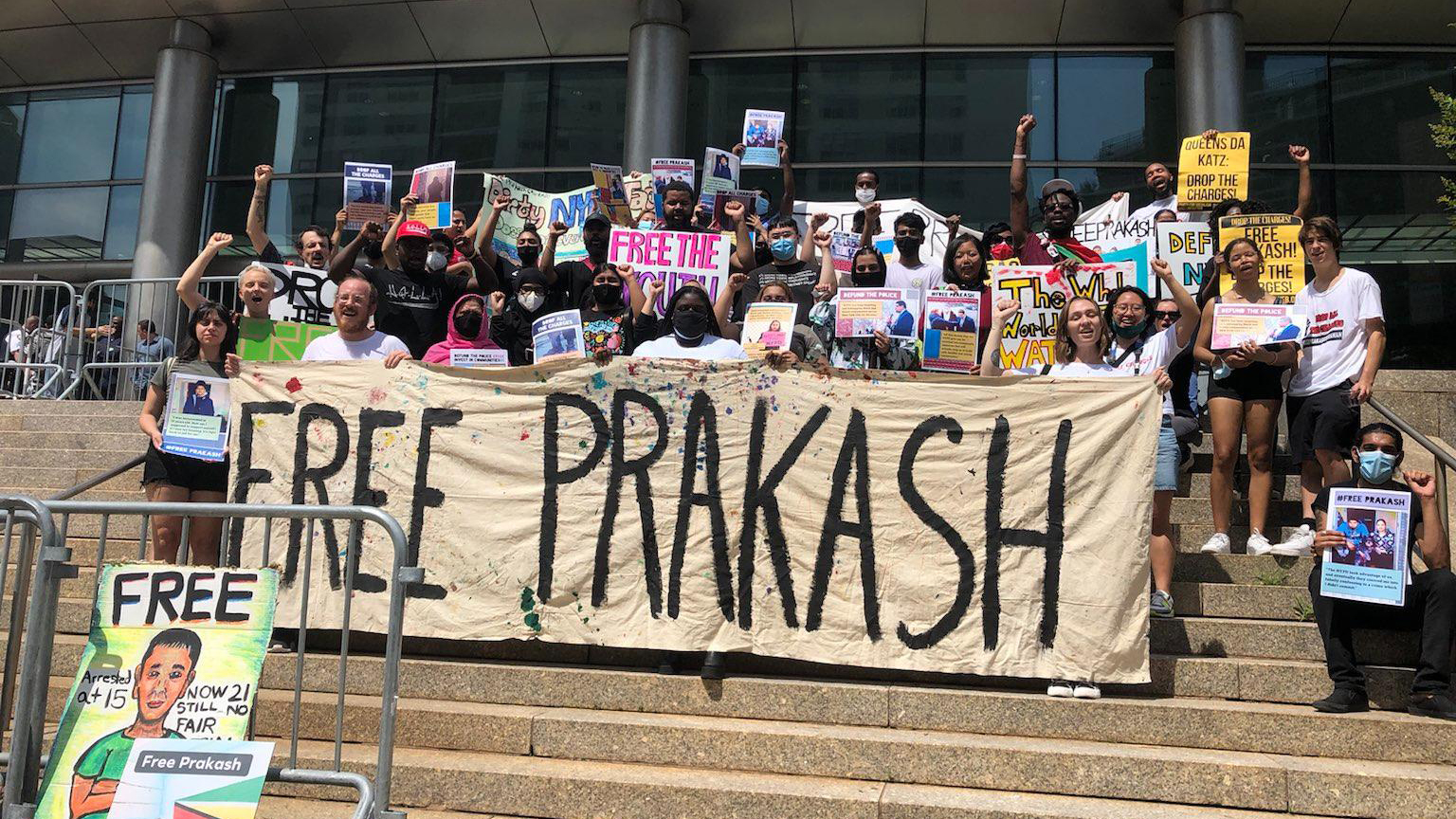Prakash Churaman was 15 years old when NYPD officers kidnapped him from his home in the early hours of the morning, drove him around in an unmarked vehicle for three hours, and upon arriving at the 113th Precinct of New York City, handcuffed him to a pipe attached to the wall. Prakash would then be interrogated for three hours and fifteen minutes by two police officers, before making incriminating statements allegedly connecting him to the crime of which there was no physical or forensic evidence of him committing.
After spending six years of his youth behind bars, Prakash, now 22, is fighting for his freedom and for the life that the US criminal justice system stole from him.
“I was manipulated, I was pressured, I was coerced”
Prakash described his experience in detail to People’s Dispatch. “On the morning of December 9th, 2014, I was wrongfully arrested by NYPD and driven around in an unmarked vehicle for approximately three hours. In all reality, the precinct from my residence at that time was 10, 15 minutes away.”
Prakash’s close friend, Taquane Clark, had been murdered in his home four days previously during a botched robbery. Clark’s grandmother, Olive Legister, who was present at the robbery, told police that she heard Prakash’s voice, but did not see him. It was based on this report that police arrested Prakash without a warrant. To this day, there is no physical evidence tying Prakash to the crime.
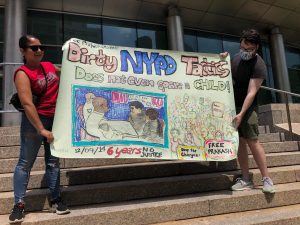
After being taken to the precinct, Prakash was reunited with his mother, and interrogated for three hours and fifteen minutes before allegedly making incriminating statements connecting him to the crime. According to Prakash, he was coerced into falsely confessing to a crime he did not commit.
“My mother and I were just taken advantage of and honestly, I was manipulated, I was pressured, I was coerced…I was scared. I was terrified. I just didn’t know what to do, what to say. Honestly, I was just in shock. Because I did not know why I was there. And then being there for hours, only intensified the pressure and the manipulation that was being utilized upon me and my mother.”
NYPD Detectives Daniel Gallagher and Barry Brown are the officers that Prakash alleges coerced him. Prakash told The Indypendent, “[Barry Brown] did most of the manipulation.” Brown was also responsible for getting a murder confession out of Chanel Lewis, which has since been called into question over concerns regarding Brown’s possible coercion. Video evidence of Lewis, a 22-year-old disabled man, makes it clear that Lewis was not well informed about his rights or the severity of his confession, and even seems to imply that Lewis believed the District Attorney was his own lawyer.
“Human beings that are accused of crimes…are treated as if we’re just animals.”
After his arrest, Prakash was sent to Crossroads, a secure juvenile detention facility in Brooklyn. After spending a year and a half at Crossroads, he was sent to the notorious Rikers Island jail complex at 17, all before even getting the chance to stand trial. “My experience incarcerated, particularly on Rikers Island, has been the most horrifying experience that I’ve ever had so far in my life,” Prakash told Peoples Dispatch. “It’s beyond dehumanizing. And it’s just beyond cruel the way human beings that are accused of crimes, that are labeled as detainees, are treated as if we’re just animals.”
According to the Vera Institute of Justice, 81.2% of people detained in New York City jails are awaiting trial. This means that the vast majority of those incarcerated in New York City jails have not been convicted of any crime. In 2017, The Gothamist reported that half of all pretrial detainees in NYC jails are detained because they cannot afford bail. And although constitutionally, every US defendant has a right to a speedy trial, many, like Prakash, are forced to spend years in jail before being convicted.
US prisons are notoriously cruel and overcrowded. At 2.3 million prisoners, the US has the largest prison population in the world. Solitary confinement, which has been labeled a form of torture by various human rights organizations, is common, with 20% of prisoners kept in isolation. Rikers Island, in particular, is infamous for the high rates of prisoner deaths, especially suicide. In 2021, 15 people died while incarcerated at Rikers, due to suicide, overdose, medical negligence, or unknown causes.
The Kalief Browder case can help illustrate the “horrifying” environment that Prakash encountered while at Rikers. Then 16-year-old Browder, was accused, based on inconsistent testimony, of stealing a backpack. After refusing to plead guilty, he was arrested and charged. His family could not afford his $3,000 bail, and so he languished at Rikers for the next three years of his life. While incarcerated, Browder encountered what the U.S. Attorney for the Southern District of New York described as a “deep-seated culture of violence,” with frequent abuse by prisoners and guards alike. Browder spent his imprisonment in and out of solitary confinement, mostly after fights with other prisoners. Browder later revealed that while in solitary, he was physically abused by guards. Two years after he was finally released, and after enduring three years of beatings, torture, and abuse, Browder committed suicide.
“One day, the truth is gonna prevail.”
Despite dire conditions, Prakash did not lose hope for a release. “I’ve had a lot of dark nights and days in that cell. But, I don’t know, for some reason, I just woke up every day, telling myself, one day, the truth is gonna prevail,” Prakash told Peoples Dispatch. “Honestly, there were days I just felt like my life was over. That I was just gonna rot in a cell for the rest of my life.” Initially, Prakash’s case had little support or notoriety. Prakash himself organized a defense team, a support network, and media recognition. Prakash left messages at radio stations, and enlisted allies like Jacob Cohen, his music teacher at Rikers Island, to help him raise funds.
When asked what motivated him despite years in prison, Prakash answered: “Just the simple fact of me being incarcerated for all those years before I decided to take initiative to raise awareness and amplify my voice and my story. I was muted. I was silenced from society for years. No one knew who I was. No one knew where I was. I was just off the map. I did not exist to society.”
At 19 years old, after building advocacy and a support network, Prakash was finally able to stand trial for the crime he was accused of. However, Judge Kenneth Holder denied the defense the right to present an expert witness on juvenile forced confessions, despite the fact that Prakash’s confession was the prosecution’s primary evidence, with nothing else tying Prakash to the crime. Prakash lost his trial, and was convicted and sentenced to 9 years to life.
According to The Indypendent, “[Kenneth] Holder has had 27 cases overturned, almost all of them for pro-prosecution abuses such as excessive sentencing and improper jury instruction”. Justice Holder has faced no consequences for these actions. In fact, even though Prakash since successfully appealed his conviction in May 2020, the same judge is now presiding over Prakash’s new trial.
“I just cherish every last moment that I have now with my family.”
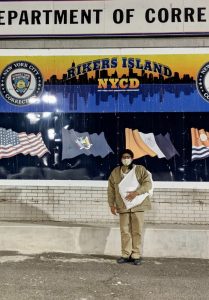
Although Prakash appealed his conviction, he was still locked up for months afterwards. Yet Prakash remained optimistic. After Prakash’s conviction was overturned by an appellate court, Prakash says, “I’ve been given a second opportunity to fight inside the courtroom and prove my innocence which in and of itself is rare when you’re faced with a system like the one I’m facing right now…I felt like I was reborn and given a second chance to fight.”
Finally, in December of 2020, Prakash and his lawyer, Jose Nieves, won his release on bail. After six years incarcerated, Prakash was placed in home confinement, and finally allowed to see his family. Prakash told Peoples Dispatch, “Honestly until this day, all of it still feels surreal to me…I’m so used to being in a closed in environment, where I’m told what to do, when to do it, how to do it…I still wake up every day, to this day, like, is this real?”
“I was just so overwhelmingly happy and just grateful,” Prakash continued. “Because I was just so used to my jail visits on Rikers island, just 30 minutes and 45 minute visits, and not even being able to hug my family, you know? I just think about all of that. I just cherish every last moment that I have now with my family.”
Despite this enormous victory, Prakash’s life in home confinement has come with new challenges. Prakash recently welcomed his new son into his family, and is raising funds to support his and his family’s living expenses, as per his confinement he is not allowed to find employment. “It’s far better than being in a jail cell in Rikers island,” Prakash says. “I mean, I would prefer to have the opportunity to engage in employment and provide for myself and my family…I feel like I was just moved out of an actual jail cell and just put into my home now where it’s kind of like my jail cell now.”
“I am going to make sure they put a tight, tight rein on his ankle bracelet.”
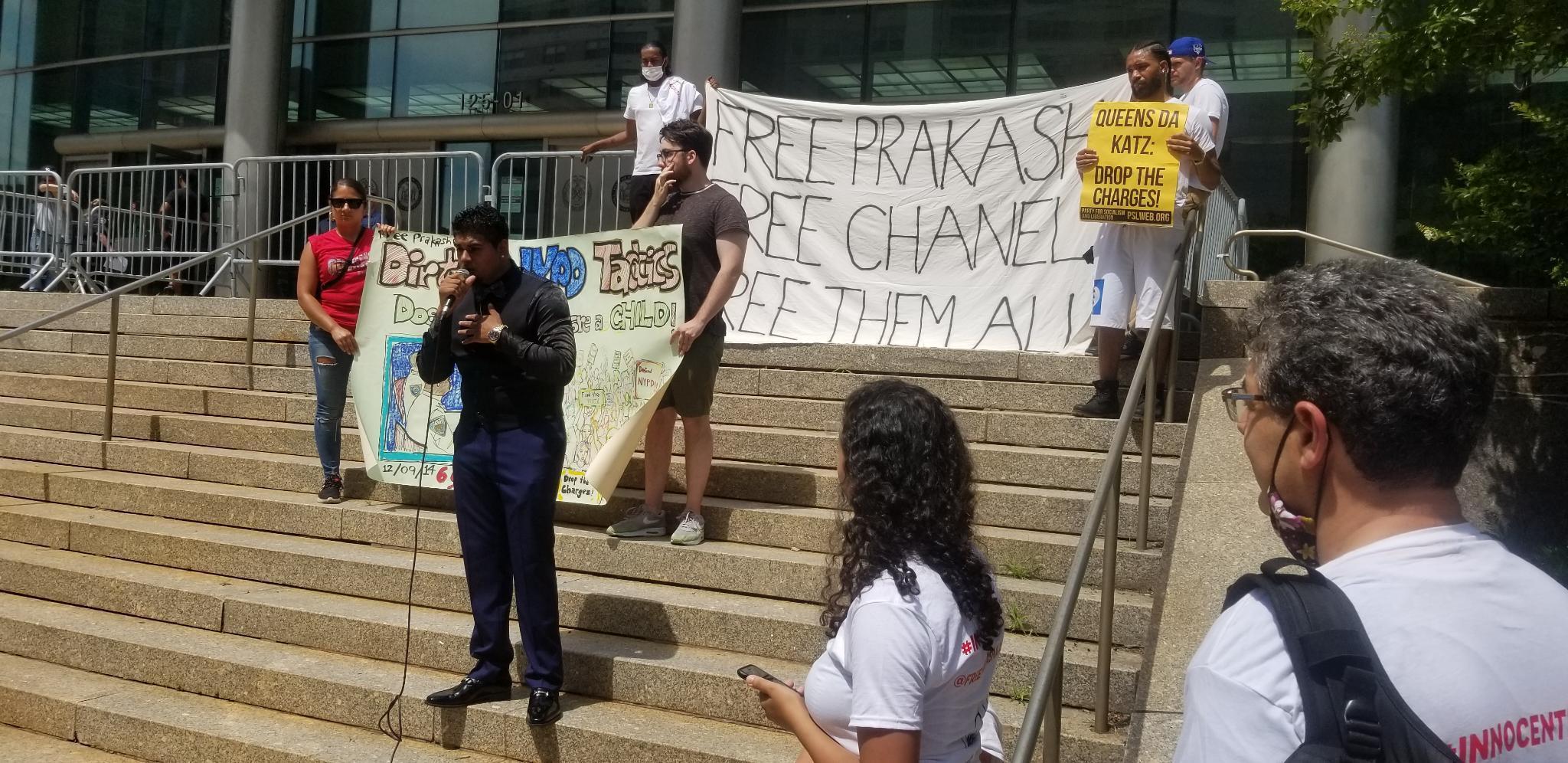
Prakash and his supporters in the Free Prakash Alliance continue to organize for his release. Prakash has spoken numerous times at rallies on the steps of the Queens Criminal Court, and supporters have organized phone zaps to Queens District Attorney Melinda Katz, urging her to drop all charges against Prakash. In November, organizers with the Free Prakash Alliance disrupted Katz’s public Diwali celebration, arguing that it was hypocritical for her to celebrate South Asian culture while keeping New Yorkers of South Asian ancestry locked up, like Prakash.
Tonight: @QueensDAKatz held a Diwali event talking about diversity & inclusion while she JAILS Black & Brown youth from our communities like @freedom4prakash
SHAME ON KATZ using Diwali to hide the harm the she has brought to our Sth Asn + Indo-Carib communities #DropTheCharges pic.twitter.com/I571TEPi10
— DRUM #FreePrakashChuraman (@DesisRisingUp) November 9, 2021
The attention his case has received due to these efforts has not gone unnoticed by the New York City criminal justice machine, especially Judge Kenneth Holder. During his last court appearance, on January 19th, Justice Holder ruled that Prakash was no longer allowed to speak at rallies, because as the Justice argued, this was a violation of home confinement. As stated by Prakash’s attorney, Jose Nieves, this decision was “an infringement of [Prakash’s] First Amendment rights to free speech”. Holder went as far as to express his disapproval of Prakash exercising his right to speak to the press, stating, “There’s been enough banter about this case in the media, none of which makes any sense and most of which is ridiculous that I see, but you haven’t seen me stop it. I haven’t told him to shut up, I haven’t put a gag order on this, I haven’t put a gag order on you. I am considering it, but I haven’t done it…I am going to call the sheriff, I am going to make sure they put a tight, tight rein on his ankle bracelet.”
And today Prakash appeared in court for the 91st time. The judge and prosecution accused him of using press and social media to sway public opinion and "attempt to influence the jury pool." The judge then ruled Prakash can no longer give speeches at our rallies at his hearings 1/ https://t.co/fzJPtcHqES
— Radio Free Amanda 余美娜 (@catcontentonly) January 20, 2022
This is not the first time the criminal justice system has tried to silence Prakash—Rikers Island music teacher Jacob Cohen was fired from his post and banned from working in the jail complex for life for sharing Prakash’s story. But Prakash and his supporters have never backed down from spreading the word about his case. In fact, as Prakash’s own experience winning his release shows, public awareness of injustice can change a person’s life.
“Continue to have hope”
Prakash has become familiar with the US criminal justice system, and can point to many things that need to be changed so that no one has to endure what he endured. According to Prakash, he was never treated like he was “innocent until proven guilty”, despite the fact that presumption of innocence is a universal human right and supposedly a guiding principle of the US legal system. “Ever since I’ve been placed in handcuffs, I was already automatically labeled by the system: guilty,” he told Peoples Dispatch.
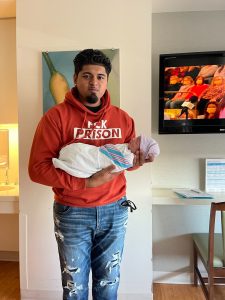
When asked what he would change about the criminal justice system today, Prakash listed four primary issues: pretrial detention, bail reform, juvenile interrogations, and the usage of “earwitnesses”, or those who make accusations based on what they heard as a crime was occurring, not what they saw.
Prakash told Peoples Dispatch, “I feel like individuals that are accused of crimes, whatever the crime may be, they should feel it should affect that they are treated with the presumption of innocence. And also just be given the opportunity to fight their case outside of a jail cell.” Prakash continued: “Just how the bail system operates, even though there was a bail reform here in New York, there still needs to be more work…Juvenile interrogations….Just given the fact that I am a victim of police coercion. I was lied to for hours…I feel that all juveniles that are arrested and interrogated or questioned by law enforcement must have an attorney present prior to any questioning or interrogation.” On the usage of “earwitnesses” Prakash said, “If someone could misidentify you with their eyes, what would you think about someone making allegations that they heard your voice?”
Prakash will have his 92nd court appearance on Monday, February 7. Prakash is fighting for his life: by refusing a plea deal in 2020 that would have allowed him to leave jail soon, if he pled guilty, Prakash has never admitted guilt for a crime he did not commit. However, by taking his case to trial rather than negotiating a deal, he is taking an enormous risk that his second trial will result in a much lengthier sentence. Prakash continues to try to raise awareness about his case, and his supporters also continue their efforts to shine a light on injustice.
When asked what he would tell others who find themselves behind bars for a crime they didn’t commit, Prakash said, “Continue to have hope…wake up every day with that drive, that you will prove your innocence and that the truth will prevail itself.”
To contribute funds for Prakash to be able to sustain himself and his family, donate to his Gofundme campaign.
To demand that D.A. Melinda Katz drop all charges against Prakash, sign the petition.
To learn more about the Free Prakash Alliance, visit their Linktree.


